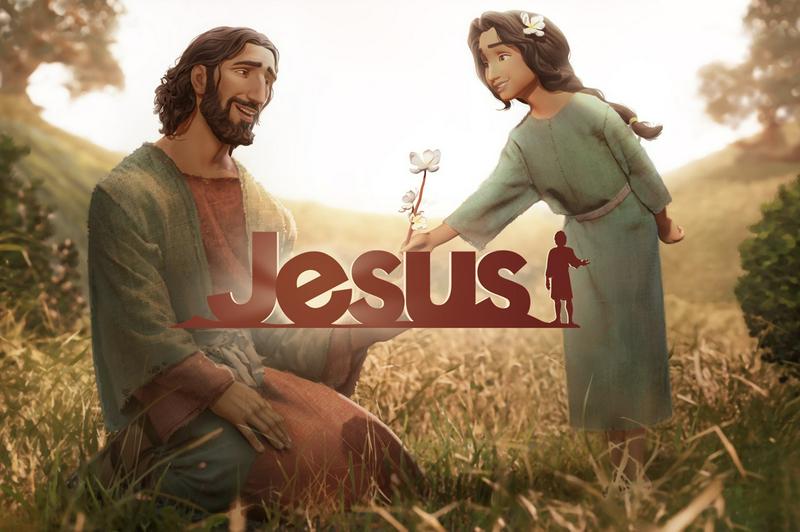Editor’s note: The Jesus Film Project of the Cru Ministry is working on reimagining the iconic "Jesus" (1979) film. The new animated film "JESUS" is intended to serve as a mission tool in the form of animation that resonates with all people, particularly the younger generation worldwide. The anticipated released time is around Christmas 2025 (now the official website adjusts the release time to Christmas 2026). In an exclusive interview with China Christian Daily, Geoff Peters, global marketing director of the team, gives detailed information about the animated film, including insights into the production team, the film’s progress, the new technology being employed, and the distribution method.
China Christian Daily: Please introduce the Jesus Film Project and also describe your role in it.
Geoff Peters: Jesus Film Project is a media ministry that was founded as a result of the live-action film by the name of Jesus. The "Jesus" film came out in 1979 in the United States and has since gone on to become the most-watched and most-translated film in world history. The Jesus Film Project ministry was founded with the intention and purpose of helping that film and the message of Jesus through that film spread all around the world.
I have been brought on as the global marketing director, specifically related to the new animated project, which is an animated re-imagining of that original 1979 film. This film will also be called "JESUS," and that animated film will come out worldwide at the end of 2025.
China Christian Daily: We noticed that the Jesus Film Project is a part of the Cru Ministry, so can you introduce Cru to us?
Geoff Peters: Cru is the U.S. name for the ministry called Campus Crusade for Christ International. Since 1951, Cru has multiple attached ministries, but the overall mission of Campus Crusade for Christ is to win, build, and send Christ-centered, multiplying disciples who launch spiritual movements. The Jesus Film Project began as a part of that ministry in 1979.
China Christian Daily: Could you briefly outline the current progress of the reimagined film?
Geoff Peters: It has been a long process, which has been going on for some people as far back as eight or nine years ago, as they began imagining what it could look like to have an animated version. It’s only just been in the last two years that they have identified an animation style and, ultimately, the right partner production company to begin working on the project to its completion.
At this point, we have completed the story design and the entire script. Everything that Jesus says in the film comes directly from the Gospels, predominantly the Gospel of Luke, with some additional pieces from the Gospels of Matthew and John. We are now starting to see some of the initial looks of the animation. A big part of the struggle has been that the technology we’re trying to use is not one that’s been used for an animated film before, so the process does take a little bit more time. But we are on track to release around December, Christmas time in 2025, or shortly thereafter.
China Christian Daily: Why did you choose to reimagine the Jesus film in animated form? What are the similarities and differences between this film and the 1979 version?
Geoff Peters: We recognize that a younger generation now resonates with animation. In fact, the world resonates with animation in a way that has never before happened. One of the great opportunities that animation gives us is that people from every culture, every background, and every language group all engage with animation, and it is often easier for us to see ourselves in an animated character than in someone of a different culture or background who happens to be a live-action actor or actress.
One of the most amazing opportunities we have is that the production team for this film is a best-in-class team of designers and creatives from films from Disney, DreamWorks, and Pixar. They're working alongside some of the most world-renowned biblical historians and archaeologists. What we're able to create is a historically and archaeologically accurate depiction of Jerusalem, Capernaum, and these locations in a way that is more authentic to the way they looked at the time of Jesus than anything else has ever been possible.
The 1979 live-action version was done with actors and actresses on location and filmed with standard cameras in the way that most live-action films are made. So even the locations depicted in that film were not as they would have looked at that time. The 1979 version was about two hours in length, while the reimagined film will be about 90 minutes shorter in length.
China Christian Daily: How was the talented production team gathered? What divine guidance did the team experience throughout the process?
Geoff Peters: God is the one who brought all of these workers together. The animation team right now consists of about 70 or 80 animators who are located all around the world. Most of them are believers who have been excited to finally feel like they are using the skills God has given them to tell His story to the world. Many are not believers, and it's oftentimes the non-believers who are raising questions that force us to tell a better story.
As Christians, we have read the Bible. We know how Jesus gets from one place to the next, and we make assumptions because we know the stories. But for people who have never heard the story, they sometimes raise those questions: How did Jesus get from this city to that city? Why did he say this? It forces us, in the storytelling process, to create something that is more complete.
The writer on this project is Barry Cook, the director of Disney's original film "Mulan". He is the person who took the initial script from that original film and the Gospels of Luke, Matthew, and John and pulled together a script that was based exclusively on the Gospels. He brought with him Dominic Corola, who was a part of the production of Disney's "The Lion King". We also have people who are involved with many other films, from "Avatar" to "Star Wars".
China Christian Daily: What are the main challenges you have faced during the production process? How did you overcome them?
Geoff Peters: We've had two most significant challenges in this film. The first is that this film, which was designed and thought of first as a ministry tool, happens to be a film, so that comes with challenges related to distribution. The traditional commercial distribution mechanisms all rely on a contract with the distributor that allows the distributor to have exclusive rights to the film for a certain period of time. Anytime we give exclusive rights to one distributor over another, churches and ministries cannot freely use the film while that distributor has exclusive rights in that time frame. So we are going to be looking for nontraditional distribution mechanisms and having a theatrical release in as many countries as possible, not in a way that will restrict access or free access to the film for a long period of time. Of course, it'll be on streaming platforms and freely available as well.
The second piece is the technology component. The way that media is consumed today is not the way media will be consumed five years or ten years from now, which forced us to look for new mechanisms, software, and ideas for bringing this film into existence. We needed to create a film that was going to stand the test of time and be able to speak the animation and immersive language of the younger generations, and we overcame that by using a video game engine software called Unreal Engine. This film will be perhaps the first full-length animated film in history created entirely utilizing Unreal Engine. We have been able to create a three-dimensional Capernaum or Jerusalem where you can walk in and out of every building, a biblically and historically accurate version of these cities based on the historical and archaeological record. There will also be the ability for people to step into the film at home on their own computer and observe parts of the film: be in the crowd at the crucifixion, in the room during the last supper, or learn at the feet of Jesus alongside his other disciples. It's a beautiful opportunity, and it's never been done before.
China Christian Daily: If you choose the non-traditional distribution mechanisms, what about the financial pressure?
Geoff Peters: This film will be fully funded by donations from Christians in the U.S. and other countries around the world. One of the great legacies of the 1979 film is that there are people all over the world whose lives have been touched and impacted by it. So there is a network of people who are excited about giving to make this film not only possible but also ensuring that it is freely available without the pressures of ticket sales or recovering an investment amount.
The other important thing to point out is that the original film, released in 1979, has been translated into over 2,100 languages. This new film will also be available in over 2,100 languages within the first three to five years of its release. So we want to make sure that the film is freely available as quickly as possible to as many places and in as many languages as possible.
China Christian Daily: Does the Jesus Film Project have any plans to produce additional films in the future?
Geoff Peters: Yes, but that's simply a result of us recognizing what we are making as a part of this (the reimagined film). Once the film is done, we will have a three-dimensional digital Jesus, all the disciples, Capernaum, Jerusalem, and all other places. So, absolutely, I see more stories being told as part of these animated stories of Jesus in the Bible.
China Christian Daily: We know that the "Jesus" film (1979) holds immense influence worldwide. Many ministries employ it for evangelism in Africa, where many viewers convert to Jesus after watching the film. What expectations do you have for how the new film will resonate with the younger generation?
Geoff Peters: We hope that the longevity of this film will have a similar impact (with the 1979 version) on the world. But ultimately, that's the work of the Holy Spirit. The mission of the ministry of Campus Crusades for Christ, of which the Jesus film is a part, is to win disciples for Jesus, build them up as disciples, and send them out. That means that the journey does not end at the point at which someone says yes to following Jesus. In fact, that's when the journey begins. It's about getting people to say yes to Jesus, follow his example, and continue to share his message of love, peace, and truth with other people in their own communities and families.
China Christian Daily: When the film is released in December 2025, do you have plans for releasing it in China?
Geoff Peters: Our hope is absolutely to release it in China around that same time frame. Our current goal and process involve identifying different ministry partners in various countries around the world. As soon as we identify a ministry partner in China, we will rely on that partner to help us make decisions about how the film should be distributed and about who can take ownership of the film in China. It will be the local Chinese church and local ministry leaders inside China who know best how it should be distributed and used. My hope is that even through this interview, we will be able to connect with people who can reach out to us.
Anyone who's interested in getting more information about the film or contacting us with ideas for China can visit our website at asj.jesusfilm.org. Go to that site and choose the "Stay Connected" button to reach out to us directly if you have questions. That's also the place to sign up if you'd like to stay connected for any additional updates related to the film as we continue to move forward.













